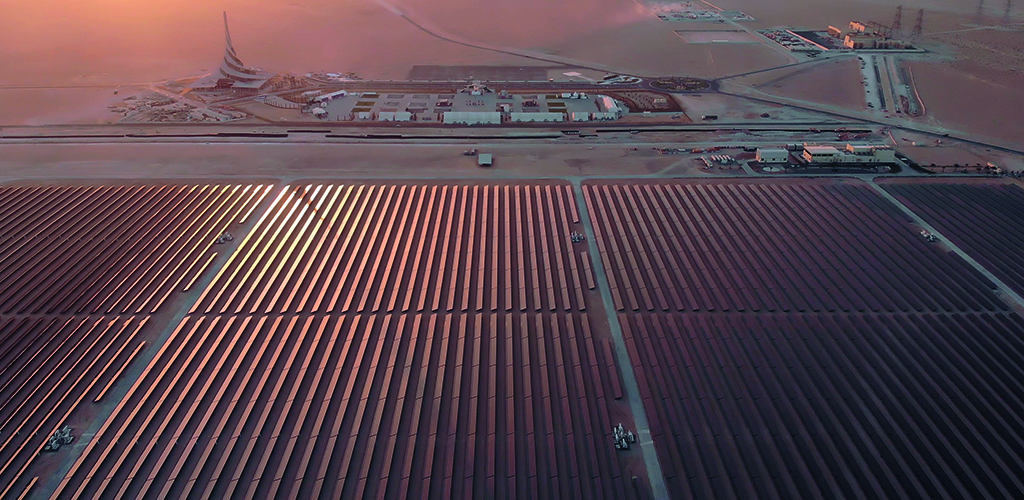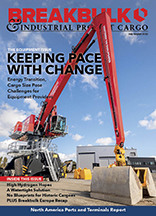Jun 29 | 2022
Dual Support for Oil and Renewable Projects

By Thomas Timlen
 Abu Dhabi National Oil Co., or ADNOC, a leading diversified energy and petrochemicals group wholly owned by the Emirate of Abu Dhabi, recently awarded US$658 million in framework agreements for new oil wells. This speaks to the emirate’s ambition of creating the preeminent oil storage and supply hub in the Middle East, while enhancing opportunities for the project cargo sector.
Abu Dhabi National Oil Co., or ADNOC, a leading diversified energy and petrochemicals group wholly owned by the Emirate of Abu Dhabi, recently awarded US$658 million in framework agreements for new oil wells. This speaks to the emirate’s ambition of creating the preeminent oil storage and supply hub in the Middle East, while enhancing opportunities for the project cargo sector.The framework agreements were awarded to Haliburton Worldwide Ltd. Abu Dhabi, Baker Middle East, Emirates Western Oil Well Drilling & Maintenance Co., NESR Energy Services and Emjel Oil Field Services, following a competitive tender process.
These awards cover ADNOC’s onshore and offshore fields and will run for five years with an option for a further two years. More than 65 percent of the award value could flow back into the UAE economy under ADNOC’s In-Country Value program over the duration of the agreements. Furthermore, skilled employment opportunities will be created for UAE nationals by these companies who will also work to identify local manufacturing opportunities.
Yaser Saeed Almazrouei, ADNOC upstream executive director, said: “the awards for cementing services will support the ongoing expansion of ADNOC’s drilling activities as we grow our production capacity, strengthening our position as a reliable global supplier of some of the world’s most carbon-efficient barrels.
“In line with the UAE leadership’s wise directives and as part of our strategy, we are prioritizing in-country value and these awards will enable careers for UAE nationals and new opportunities for the private sector, directly supporting the objectives of the UAE’s Principles of the 50.”
As evidenced by ADNOC’s recent moves, the UAE is experiencing a concerted push to boost the energy sector, through a combination of initiatives that together will serve as a sustained driver for project cargo transportation and heavy-lift services. Several goals are being pursued, namely: the drilling of thousands of new oil wells, and expansion of oil storage capacity under the “Operation 300 Billion” plan; and the creation of 13,500 industrial companies between 2021 and 2031 in the manufacturing, construction, electricity, gas, mining, and quarrying sectors.
Black Pearl Project
Fujairah port has been expanding its storage capacity and its ability to accommodate ever-larger vessels under the Black Pearl project over several years.
Ports such as Fujairah will play an important role, as the equipment and materials required for the energy sector growth will put increasing burdens on key links in the logistics chain. Johan Thuresson, general manager for shipping services at GAC Dubai and GAC Fujairah, said that Fujairah’s expansion – of both container and general cargo capacities – is expected to continue as a result of these initiatives, thereby maintaining steady demand for project cargo transportation services. “The expansion project increases the terminal’s general cargo and multipurpose area for general cargo and roll-on, roll-off services,” he told Breakbulk. “It also increases container capacity, which creates a high demand for project cargo under general and containerized cargo.”
Thuresson added that Fujairah’s expansion covers a location that bridges shipping routes between east and west, potentially tapping into business opportunities in emerging trade routes and new partnerships.
“AD Ports has expanded its capabilities and reach within Abu Dhabi by serving new locations such as Freeport, Al Dhafra and others and increasing capacity by dredging and infrastructure development. In Fujairah, they are more into dredging and increasing vessel capacity within its existing facility with infrastructure development for the energy industry,” he said.
ADNOC has not restricted new initiatives solely to wells; Thuresson points to ADNOC’s recent announcement regarding its new carbon-efficient liquefied natural gas plant in Fujairah that is moving to the design stage. “The project is expected to increase ADNOC’s LNG production capacity by 9 Mtpa (million tonnes per annum), as they respond to the growing global demand for natural gas. The plant is also set to become one of the world’s lowest carbon intensity LNG production facilities by incorporating new technologies and running on clean power.” The design stage is expected to be followed by the award of an engineering, procurement and construction contract in 2023.
There have been many noteworthy energy-related project cargo developments of late. One Thuresson describes as a milestone for AD Ports: “Fujairah Terminals is part of Abu Dhabi Ports, the region’s premier facilitator of logistics, transport and trade,” he explained. “The terminal has recently completed another significant milestone as part of the ongoing developments of Fujairah F3 Power Plant Project with a successful handover of three of the largest gas turbines to have ever been deployed in the UAE region. Scheduled for commissioning in 2023, the Fujairah F3 Power Plant Project will be the largest Combined Cycle Power Plant (CCPP) facility in the UAE, generating sufficient electricity to power the equivalent of 380,000 households.”
It is one of the largest and most technical projects in the region. One move saw the shipment of three gas turbines, each weighing 528 tonnes and measuring 13.85 meters in length, 6.12 meters in width and 5.98 meters in height.
‘Sustained Support’ for Project Cargo
In view of the ongoing development and expansion of the UAE’s offshore fields, onshore fields, port storage facilities, and port vessel facilities in addition to the UAE’s plans to expand mining, quarrying and the related demands for infrastructure, Thuresson sees this activity, taken together, as acting to support sustained and increasing demand for project cargo transport for movements.
“The UAE seaports serve as both international and regional hubs, and are essential in driving and facilitating economic growth and diversification. Investment in augmenting both on- and offshore infrastructure puts the UAE in a good position to meet growing demands for project cargo movement by both sea and road. In addition, it ensures each emirate will sustain their businesses from these initiatives.
“Moreover,” he continues, “the UAE railway program, Etihad Rail, linking the seven Emirates, establishes an integrated system for transporting goods and passengers across the country.” The program includes three key projects: freight rail, rail passenger services and integrated transportation. By 2030, the project is expected to create economic and business opportunities in the rail, logistics and transportation industries by transporting cargoes efficiently across the country.
Green Transition Support
The UAE is adopting a balanced, proactive and positive approach to the energy transition that is “pro-growth, pro-sustainability, pro-prosperity and pro-climate,” according to Dr. Sultan Ahmed Al Jaber, Minister of Industry and Advanced Technology, special envoy for climate change and managing director and group CEO of ADNOC.
“Abu Dhabi has ongoing energy expansion and upgrade projects, whereas Dubai is engaged with construction projects contributing to the increased project cargo shipping and logistics requirements.”
Al Jaber added that the region’s drydocks are busy with vessel conversions to meet reen regulations. In addition, new rig building orders are in development at Hamriya and Ras Al Kaimah. Power projects is another focus area where the UAE authorities are busy building up additional capacity.
The UAE has an official goal of expanding its crude oil production capacity from 4 million bpd today to 5 million bpd before 2030. Some may wonder if the goal of achieving 5 million barrels per day production capacity is realistic in the short term, or whether there are reasons to expect that will this be a longer-term endeavor. In view of the committed actions backing up the pursuit of this goal, Thuresson is an optimist. “Yes, with the ongoing efforts to progress the country’s trade, logistics and other developments, the UAE aims to achieve its goal ahead of the official 2030 target year.”
While seeking to reach such benchmarks in the near term, the UAE is simultaneously playing the long game. Addressing the Atlantic Council Global Energy Forum in March, Al Jaber explained that the UAE is driving a new low-carbon, high-growth economic model that will guide its development for the next 50 years. He credited the UAE Leadership’s wisdom and foresight for laying the foundation for the country’s progressive approach to climate action that has ensured it is well-positioned to capitalize on the opportunities created by the energy transition.
“When the UAE began its investments in renewable energy over 15 years ago, the economic case was difficult to make,” he said. “But our leadership’s vision has been verified by hard facts. And today, the UAE is home to the three largest and lowest cost solar plants in the world.”
Clearly, while renewable energy facilities are expanded over the long term, production capacities of oil and gas facilities are not being ignored. It seems there is project cargo support to cover all eventualities in the UAE.
Thomas Timlen is a Singapore-based analyst, researcher, writer and spokesperson with 31 years of experience addressing the regulatory and operational issues that impact all sectors of the maritime industry.
